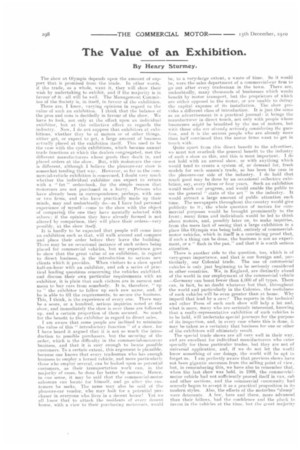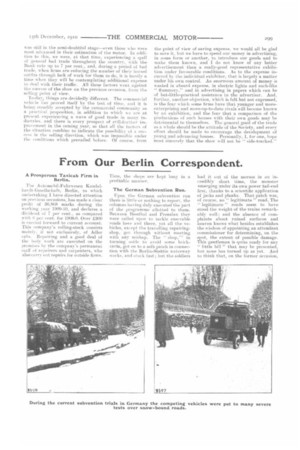The Value of an Exhibition.
Page 4

Page 5

If you've noticed an error in this article please click here to report it so we can fix it.
By Henry Sturrney.
The show at Olympia depends upon the amount of siipport that is promised from the trade. In other words, if the trade, as a whole, want it, they will show their wish by undertaking to exhibit, and if the majority is in favour oil it -all will be well. The Management Committee of the Society is, in itself, in favour of the exhibition.
There are, I know, varying opinions in regard to the value of such an exhibition. I think that the balance of the pros and cons is decidedly in favour of the show. We have to look, not only atthe effect upon an individual exhibitor, but at the collettive effect as regards the industry. Now, 1 du not suppose that exhibitors at exhibitions, whether they be of motors or of other things, either get, or expect to get, a Targe amount of business :lethally placed at the exhibition itself. This used to be the case with the cycle exhibitions, which became annual trade functions at which the dealers congregated, met the different manufacturers whose goods they dealt in and placed orders at the show. But, with motorcars the case is different, although 1 believe the pleasure-car show is somewhat tending that way. However, so far as the commercial-vehicle exhibition is concerned, I doubt very much whether the individual exhibitor can expect to return with a " fat " order-book, for the simple reason that motorcars are not purchased in a hurry. Persons who have already been in correspondence, perhaps, with one or two firms, and who have practically made up their minds, may and undoubtedly do—as I have had personal experience of myself—come to the show with the object of comparink the one they have mentally selected with others; if the opinion they have already formed is not altered by comparison, they will place their orders—very pos.sibly. at the show itselji.
It is hardly to be expected that people will come into an exhibition such as that, will walk around and compare and place their order before they have the building. There may be an occasional instance of such orders being placed for commercial vehicles, hut my experience goes to show that the great value of an exhibition, in regard to direct business, is the introduction to serious new clients which it provides. When visitors to a show spend half-an-hour with an exhibitor, and ask a series of practical leading questions concerning the vehicles exhibited. and discuss their own particular requirements with an exhibitor, it is plain that such visitors are in earnest and mean to buy cars from somebody. It is, therefore. " up to " the exhibitor to follow up each new name, and, if ho is able to fill the requirements, to secure the business. This, I think, is the experience of every one. There may be a score, or a hundred, serious inquiries noted at the show, and immediately the show is over these are followed up, and a certain proportion Of them secured. So much for the benefit to the exhibitor in regard to direct sales.
I am aware that some people are inclined to minimize the value of this " introductory function " of a show. for I have heard it argued that it is not so much the introduction to possible purchasers. hut the securing of the order, which is the difficulty ill the commercial-motorcar business, and that it is easy enough to locate possible customers. To a certain extent, this argument is plausible. because one knows that every tradesman who has enough business to employ a horsed vehicle, and more particularly those who employ several, can be looked upon as potential customers, as their transportation work can, in the majority of cases, be done far better by motors. Hence, in one sense, it may be said that the commercial-motor salesman can locate for himself, and go after the customers he seeks. The same may also be said of the pleasure-car vendor, who may look for a potential purdieser in everyone who lives in a decent house! Yet we all know that to attack the residents of every decent house, with a view to their purchasinr. motorcars, would be, to a very-large extent, a waste of time. So it would be, were the sales department of a commercial-car firm to go out after every tradesman in the town. There are, undoubtedly, many thousands of businesses which would benefit by motor transport, but the proprietors of which are either opposed to the motor, or are unable to defray the capital expense of its installation. The show provides a different class of introduction. It is just the same as an advertisement in a practical journal: it brings the manufacturer in direct touch, not only with people whose businesses might be benefited by the use of motors, but with those who are already seriously considering Um quest ion, and itis the serious people who are already more than half convinced that the motor firms want to get in touch with.
Quits apart from this direct benefit to the advertiser, we must not overlook the general benefit to the industry of such a show as this, and this is most impurtant. I do not hold with an annual show, or with anything which would tend to create a system of, or demand for, fresh models for each season's trade, as has been the case in the pleasure-car side of the industry. T do hold that much good may be done by an occasional collective exhibition, say, every three or four years. Such an exhibition would mark our progress, and would enablethe public to see the general " state of the art " in the industry. It would attract a large amount of public attention each time. The newspapers throughout the country would give publicity to it ; the whole question of motors for commercial purposes would be brought prominently to the front ; many firms and individuals would be led to think about motors, and, possibly later on, to make inquiries, Irons the mere fact of seeing that a large exhibition in a place like Olympia was being held, entirely of commercialmotor vehicles, which in itselT is a convincing proof that, if such a thing can he done, the business is not an experiment-, or a " flash in the pan," and that it is worth serious attention.
There is another side to the question' too, which is of very-great importance, and that is our foreign and, particularly-, our Colonial trade. The use of commercial vehicles is only just beginning to be seriously considered in other countries. We, in England, are distinctly ahead of the world in our employment of the commercial vehicle —Germany can boast fewer than 4,000 of all types. There can, in fact, be no doubt whatever but that, through-out the world and particularly in the colonies, the usefulness of such vehicles will be even greater than at home. Why imperil that lead by a care? The reports in the technical and other Press of each such show will help it lot and, what is more, many who are seriously interested, knowing that a really-representative exhibition of such vehicles is to be held, will undertake special journeys for the purposeof its inspection, and, in every case where this is done, it may be taken as a certainty that business for one or other of the exhibitors will ultimately result.
The special trade shows are all very well in their way, and are excellent for individual manufacturers who cater specially for those particular trades, but they are not of universal application, and, if we do not let the world know something of our doings, the world will be apt to forget us. I am perfectly aware that previous shows have not been gigantic successes from the selling point of view, but, in remembering this, we have also to remember that, when the last show was held, in 1908, the commercialmotor vehicle had not sufficiently proved itself in van, cab and other sections. and the eonnnercial community had scarcely begun to accept it as a practical proposition in its modern styles. Also, the effects of the motorbus "slump" were deterents. A, few, here and there, more advanced than their fellows. had the confidence and the pluck to invest in the vehicles at the time. hut the groat majority ,vas still in the semi-doubtful stage—even those who were most advanced in their estimation of the motor. In addition to this, we were, at that time, experiencing a spell of general bad trade throughout the country, with the Bank rate up to 7 per cent., and, during a, period of bad trade, when firms are reducing the number of their horsed outfits through lack of work for them to do, it is hardly a time when they will be contemplating additional expense to deal with their traffic. All these factors went against the success of the show on the previous omasion, from the selling point. of view.
To-day, things ore decidedly different. The commercial vehicle has proved itself by the test of time, and it is being steadily accepted by the commercial community as a practical proposition, in addition to which we are at present. experiencing a wave of good trade in many industries, and there is every prospectof still-further improvement in the coming year, so that all the lactors of the situation combine to indicate the possibility of a success in the selling direction, which was impossible under the conditions which prevailed before. Of course, from
the point of view of saving expense, we would all be glad to save it, but we have to spend our money in advertising, in NOMA form or another, to introduce our goods and to make them known; and I do not know of any better advertisement than a really-good representative exhibition under favourable conditions. As to the expense incurred by the individual exhibitor, that is largely a matter under his own control. An enormous amount of money is wasted in absurd expense, in electric lights and such-like " flummery," and in advertising in papers which can be of but-little-practical 'assistance to the advertiser. And, further, another objection, which is felt but not expressed, is the fear which some firms have that younger and moreenterprising and more-up-to-date rivals will become known by an exhibition, and the fear that a comparison of the productions of such houses with their own goods may he detrimental to themselves. The general good of the trade as a whole should be the attitude of the Society, and every effort should be made to encourage the development, of young and advancing houses. Personally, I. for one, hope most sincerely that the show will not be " side-tracked."




















